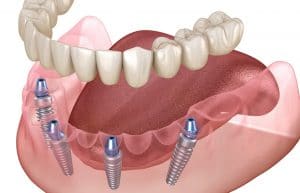 If you’ve worn a partial or full denture for a while now, you may have pleasantly forgotten what it’s like to not have two full rows of teeth. However, dentures often have ways of reminding you that they’re there, such as unexpectedly slipping or shifting as you bite, chew, or speak to someone. This movement involves several different factors, such as the level of wear on your denture and the strength of the adhesive, if any. Two of the biggest factors, however, are the lack of anchors like the roots that support your healthy teeth, and the changing shape of your jawbone due to the diminished stimulation in it.
If you’ve worn a partial or full denture for a while now, you may have pleasantly forgotten what it’s like to not have two full rows of teeth. However, dentures often have ways of reminding you that they’re there, such as unexpectedly slipping or shifting as you bite, chew, or speak to someone. This movement involves several different factors, such as the level of wear on your denture and the strength of the adhesive, if any. Two of the biggest factors, however, are the lack of anchors like the roots that support your healthy teeth, and the changing shape of your jawbone due to the diminished stimulation in it.
Why traditional dentures lose their grip
The fact that denture (or any dental prosthesis) will experience some level of wear over time seems like the most obvious reason for a denture to start slipping over time. However, the problem is often much deeper than that. After all, your denture gets its most use on the chewing surfaces of its replacement teeth, not the base that supports it. More important is the fact that your jawbone begins to change after you experience tooth loss. More specifically, after losing one or more teeth roots. Without these roots to stimulate it when you bite and chew, your jawbone receives fewer minerals and nutrients, and over time, it gradually loses mass and density as a result.
How dental implants can keep them steady
Dental implants are small prostheses that are designed specifically to replace lost teeth roots at virtually any point along your dental ridge. Each implant post is created and placed individually, making them viable for addressing all stages of tooth loss. For example, to support a complete denture on your upper or lower ridge, we can insert a series of dental implant posts spanning the length of the ridge. These posts can then be used to support your denture with greater stability and comfort, more like healthy teeth supported by natural teeth roots.
The other issues dental implants address
Replacing your lost teeth roots give dental implants two major advantages when it comes to preventing your denture from slipping. They can more securely keep your denture attached to your dental ridge, and they help preserve the strength and integrity of your jawbone from the moment you receive the implant posts. In addition to stabilizing your denture better, these effects also make implants beneficial for your long-term oral health, allowing you to fully enjoy your new smile much longer.
Improve your denture with dental implants
Preventing dental bridges and dentures from becoming loose and slipping is just one of the many different advantages that dental implants provide. To learn more about the rest of them, schedule a consultation by calling Santa Rosa Oral Surgery in Santa Rosa, CA, today at 707-545-4625

